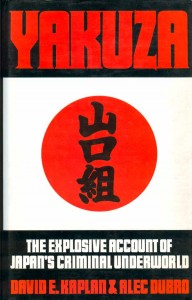 If you’re looking for a comprehensive book that provides great insight on Yakuaza business, history, culture, scams, players, this book is it, even though it was first published in 1986. Where it falls short is in the area of Yakuza and prostitution, where frankly, it has a lot of it wrong. We’ll explain why, but let’s talk about the good stuff first.
If you’re looking for a comprehensive book that provides great insight on Yakuaza business, history, culture, scams, players, this book is it, even though it was first published in 1986. Where it falls short is in the area of Yakuza and prostitution, where frankly, it has a lot of it wrong. We’ll explain why, but let’s talk about the good stuff first.
David E. Kaplan and Alec Dubro’s Yakuza: The Explosive Account of Japan’s Criminal Underworld (1986, 0-356-14226-4) is best when it details the hidden world of this very disparate group of often loosely-aligned criminal organization. Fascinating cultural elements include the Yakuza’s relationship with police (they’ve positioned themselves as municipal peacekeepers), Yakuza internal magazines, and the Yakuza film genre (naturally, they control it). The chapters on scams were wonderful, and display a creativity on the part of Yakuza that’s amazing. Gift-giving, loan sharking, and disrupting shareholders meetings (or extorting corporate money to shut-up share-holding protestors) were our personal favorites. The Yakuza have all this down to an art form.
Where we highly disagree with this book is mainly found in the chapter entitled ‘The Yakuza and Sexual Slavery.’ Here, the authors derive much of their information from Christian organizations, and the writing of Feminist author Kathleen Barry all of whom find “slavery” in virtually every venue in which money is exchanged for sex. Western Feminists and Christian groups are noted for their positions of moral colonialism when it come to sex in the East, and Kaplan and Dubro fail to offer any mention of the bias inherent in these groups. And it’s a poor position to take, as it infers that any man availing himself of women in sexual venues pro forma supports slavery.
Here at WoWasis, we’ve known women who worked as entertainers at establishments run by Yakuza. Yes they had sex with men. Yes, they were paid. And yes, they walked away, and were complimentary of their hosts. One such ‘victim’ amassed a small fortune through this trade in Japan, then returned to her home country 15 years later, talking about her wonderful experiences in the country. The authors of the book, if they indeed did interview women who had worked in the business, certainly didn’t report the story.
That’s an important caveat. The rest of the book, however, relays meaningful and interesting information about this fascinating yet little understood (in the West, that is) underworld group. Together with Martin Booth’s The Dragon Syndicates: The Global Phenomenon of the Triads, it serves as one-half of a nice couple of important library bookends to anyone desiring a greater knowledge of two of Asia’s most important and influential underworld organizations. Buy it now at the WoWasis estore, powered by Amazon.
Leave a Reply